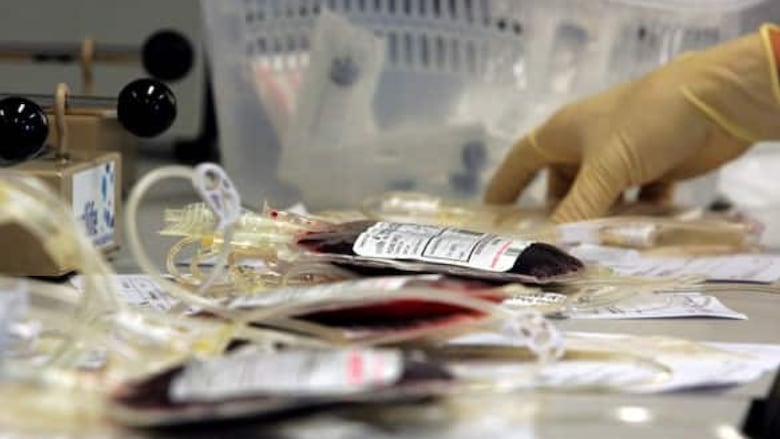Edmonton blood bank continues to pose contamination risks, Health Canada cautions
A failed inspection uncovered sanitation concerns, prompted public warning

More than two years after Health Canada warned that blood specimens stored at a private clinic in Edmonton could pose serious health risks, officials say the business has failed to address any sanitation concerns.
The Canadian Cord Blood bioRepository promises parents the chance to safeguard the stem cells contained in their baby's umbilical cord, as a form of safekeeping for future medical treatments.
But the operation, in a northwest Edmonton industrial plaza, has been mired in safety issues.
A public advisory, issued by Health Canada in November 2023, cautioned customers that the facility was unsafe. In a statement to CBC News, Health Canada said the warning still stands.
The clinic remains prohibited by law from collecting, processing, testing, or storing new cord blood and from accepting new patients.
The company has not responded to requests for comment.
Financial frustration
CBC News has heard from multiple clients of the clinic who say they are caught in financial limbo, forced to pay ongoing storage fees for stem cells that may be contaminated or dangerously degraded.
Calgary couple Carly and Ben Seligman said they preserved their children's umbilical cord blood at the facility, but said they no longer trust the specimens are safe or viable.
"It's quite frustrating from a financial perspective," Carly Seligman said.
"And it's very disappointing too in terms of the medical doors we were hoping to open in the event they were ever needed."
Stem cells from umbilical cord blood, collected at birth, can be used to treat a variety of medical issues, including blood and immune disorders, and are preserved through cryopreservation.
The Seligmans continue to receive storage invoices for the cord blood of their two children, now aged 10 and 13, but have stopped paying.
The facility charges around $900 in processing for each specimen, and roughly $120 per year after that in annual fees.
"We just have to hope that there's not going to be any need in the future for these stem cells, for either of our children, because if there is a need, we feel like we've got to write them off," Ben Seligman said.
"In many respects, that feels pretty awful."
According to Health Canada, the issues date back to 2014 and have left every sample in the clinic at risk of contamination and the transmission of infectious diseases.
In a statement to CBC News, Health Canada says the repository has failed to provide any evidence that the issues have been addressed.
Clients should not use blood from the clinic unless it has been tested by a qualified third party, officials warned.
Failed inspection
Issues uncovered during the inspection in March 2023 include processing, testing, and storing cord blood in an unclean environment, with inadequate measures to monitor temperature and humidity.
Health Canada also found issues related to a lack of qualified personnel, uncalibrated equipment, poor record-keeping and misleading advertising.
Officials said the public warning was issued due to concerns that the clinic had failed to inform its customers of the failed inspection.
When investigators first stepped in, cord blood from about 800 clients was stored on site.
Health Canada officials said the clinic has confirmed that it is no longer accepting new customers. The agency said it has no plans for further enforcement unless additional complaints come to light.
The Seligmans said they are concerned about a lack of transparency from the company and follow-up enforcement.
Carly Seligman said Health Canada should conduct additional inspections and do more to inform the public of the ongoing risk.
"We would feel better if we knew that other potentially affected people were all fully aware of the situation so they could just make informed decisions."
'A cautionary tale'
Timothy Caulfield, a health law expert at the University of Alberta, said the case demonstrates the need for stronger regulation of the industry.
Caufield, who has researched private cord blood clinics across Canada, said the case illustrates some of the common problems within the industry — overhyped marketing and misrepresentation about products that seem scientifically promising.
Private cord blood clinics often make overstated claims about the potential benefits of cord blood, preying on the medical fears of expectant parents, he said.
"These entities are exploiting the excitement around stem cells to create a product that seems like it's essential. When the reality is, the science is far from there," he said.
"The chance that you're actually going to need these samples is very, very small."
Caufield called for more robust regulation and enforcement. He said Health Canada has limited resources to conduct proactive inspections but must do more to combat health misinformation and regulate private medical industries, Caufield said.
"This story really has emerged as a cautionary tale about the nature of this industry," he said.
"It really exploits parents at a very vulnerable time."


